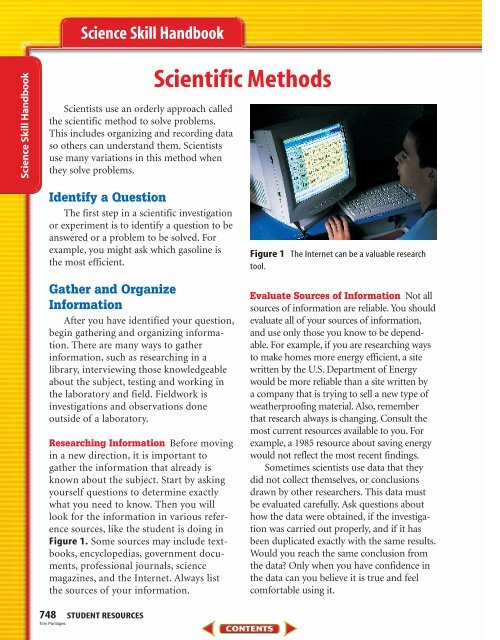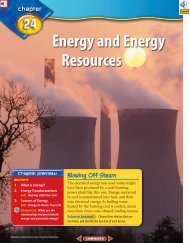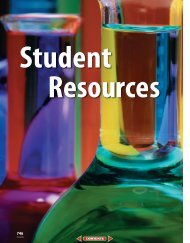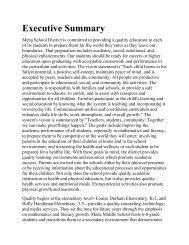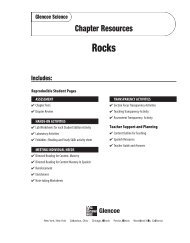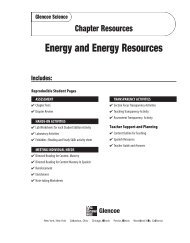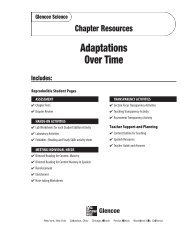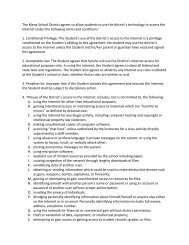Student Resources—746
Student Resources—746
Student Resources—746
You also want an ePaper? Increase the reach of your titles
YUMPU automatically turns print PDFs into web optimized ePapers that Google loves.
Science Skill Handbook<br />
Science Skill Handbook<br />
Scientists use an orderly approach called<br />
the scientific method to solve problems.<br />
This includes organizing and recording data<br />
so others can understand them. Scientists<br />
use many variations in this method when<br />
they solve problems.<br />
Identify a Question<br />
The first step in a scientific investigation<br />
or experiment is to identify a question to be<br />
answered or a problem to be solved. For<br />
example, you might ask which gasoline is<br />
the most efficient.<br />
Gather and Organize<br />
Information<br />
After you have identified your question,<br />
begin gathering and organizing information.<br />
There are many ways to gather<br />
information, such as researching in a<br />
library, interviewing those knowledgeable<br />
about the subject, testing and working in<br />
the laboratory and field. Fieldwork is<br />
investigations and observations done<br />
outside of a laboratory.<br />
Researching Information Before moving<br />
in a new direction, it is important to<br />
gather the information that already is<br />
known about the subject. Start by asking<br />
yourself questions to determine exactly<br />
what you need to know. Then you will<br />
look for the information in various reference<br />
sources, like the student is doing in<br />
Figure 1. Some sources may include textbooks,<br />
encyclopedias, government documents,<br />
professional journals, science<br />
magazines, and the Internet. Always list<br />
the sources of your information.<br />
748 STUDENT RESOURCES<br />
Tom Pantages<br />
Scientific Methods<br />
Figure 1 The Internet can be a valuable research<br />
tool.<br />
Evaluate Sources of Information Not all<br />
sources of information are reliable. You should<br />
evaluate all of your sources of information,<br />
and use only those you know to be dependable.<br />
For example, if you are researching ways<br />
to make homes more energy efficient, a site<br />
written by the U.S. Department of Energy<br />
would be more reliable than a site written by<br />
a company that is trying to sell a new type of<br />
weatherproofing material. Also, remember<br />
that research always is changing. Consult the<br />
most current resources available to you. For<br />
example, a 1985 resource about saving energy<br />
would not reflect the most recent findings.<br />
Sometimes scientists use data that they<br />
did not collect themselves, or conclusions<br />
drawn by other researchers. This data must<br />
be evaluated carefully. Ask questions about<br />
how the data were obtained, if the investigation<br />
was carried out properly, and if it has<br />
been duplicated exactly with the same results.<br />
Would you reach the same conclusion from<br />
the data? Only when you have confidence in<br />
the data can you believe it is true and feel<br />
comfortable using it.


